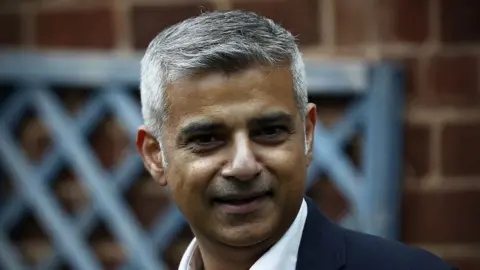Tech Tent: Facebook and Google police their platforms
 BBC
BBCHow far should the two mightiest web giants go to police the content they enable?
This week Google acted to ban crypto-currency advertising, while Facebook banned a far-right group.
Tech Tent looks at growing evidence that the social media firms are now actively editing what appears on their platforms, rather than just sitting back and allowing their users complete freedom to share any kind of content.
We hear from the South by Southwest festival where the usual optimism about the potential of tech - this after all was where Twitter took off - was replaced by anxiety about the damage social media can cause.
 Getty Images
Getty ImagesLondon's Mayor Sadiq Khan made a speech giving examples of the online abuse he'd received, warning that this could deter people from entering politics.
He is not the first politician to say "something must be done" about social media but he told the BBC that this kind of pressure was necessary: "We can't assume tech companies will find solutions by themselves, they've got to be chivvied and cajoled to take action."
It was almost certainly a coincidence but a couple of days later Facebook did act, removing the pages belonging to the far-right groups Britain First and its leader and deputy leader.
They had ignored a final written warning to stop posting material designed to promote the hatred of minority groups.
Facebook had been under pressure for months to explain why Britain First was allowed to use its platform, given the fact that its Community Standards page states that organisations that promote hatred against these groups are not permitted a presence.
It is clear that its social media megaphone, with its 2 million followers, was an extraordinarily effective platform for the group's attacks on Islam - indeed without Facebook there may not be much left of Britain First.
The fact that the company finally acted will be seen by politicians of all kinds as proof that pressure can work - which means that Facebook can expect plenty more from across the political spectrum.

Crypto-currency ads banned
For Google - the world's leading advertising platform - it was another kind of content that proved unwelcome this week. The search giant announced that from June, it would stop carrying advertising for certain financial products including "crypto-currencies and related content (including but not limited to initial coin offerings, crypto-currency exchanges, crypto-currency wallets and crypto-currency trading advice)".
Google does not really explain why it is fighting shy of the crypto-currency gold rush - which must be a lucrative source of revenue - except to say these are unregulated or speculative products.
You might expect Coinbase, one of the world's leading exchanges for Bitcoin and other crypto-currencies, to be pretty annoyed about this. But its UK boss Zeeshan Feroz seemed pretty calm when he talked to Tech Tent.
He told us that the ban was designed to curb false advertising, such as "celebrity endorsements of investment products that promise to double your money in 10 days", - and he welcomed that.
But he said the ban was too broad, insisting just like everyone else I've ever met in the crypto-currency business that his firm was very different from all of those fast buck operators.
"We are not in it just for the investment, our mission is to build an open financial system that entails these currencies being used for far more than just investment. We're trying to fundamentally redesign the financial system."
The evangelists of crypto-currencies and the blockchain will tell you that their industry is just like the web in 1994, poised to transform the way we live.
But it seems that the biggest force on the web is not ready to buy into that message quite yet.
